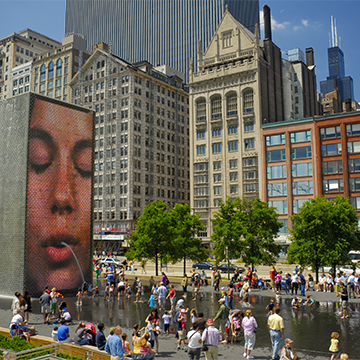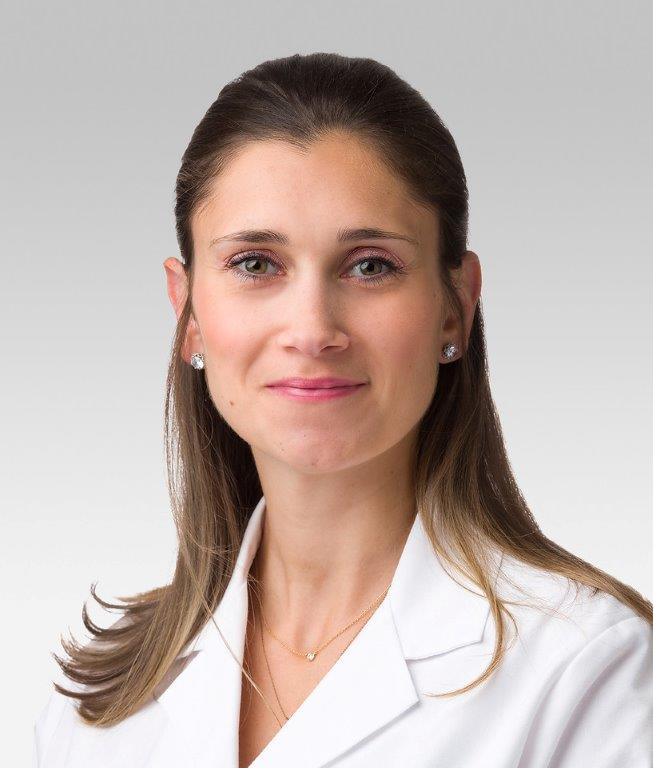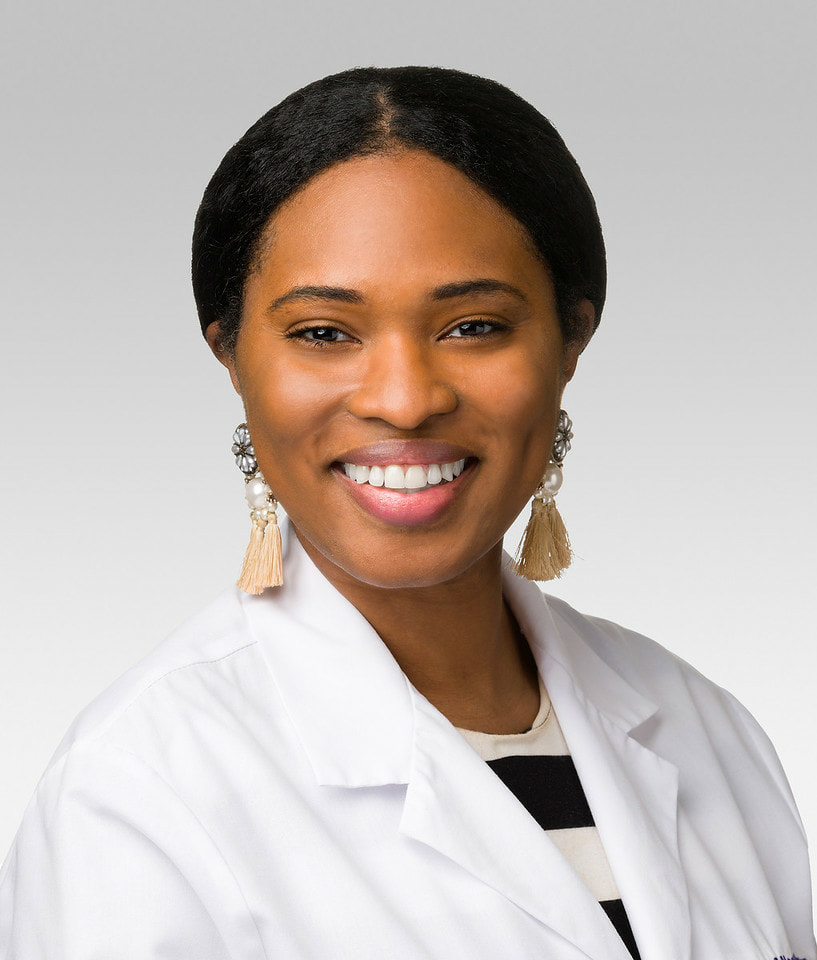Urogynecology & Reconstructive Pelvic Surgery
Northwestern University Feinberg School of Medicine’s ACGME-accredited fellowship program in Urogynecology & Reconstructive Pelvic Surgery (URPS) is an integrated training program supported by the Departments of Obstetrics & Gynecology and Urology. The primary aim of the URPS fellowship is to train surgeon scientists to provide excellent clinical and surgical care to women with complex pelvic floor disorders and become independent investigators. The fellowship is a three-year training program for gynecology applicants or a two-year program for urology applicants after successfully completing primary training in urology or gynecology. Two years are dedicated to clinical and surgical mastery of urinary incontinence and pelvic floor disorders, and the equivalent of one year is dedicated to clinical and translational research. We anticipate that our fellows will go on to advance women’s pelvic floor health as skilled surgeon-scientists and committed mentors and educators while providing exceptional clinical and surgical care. Our fellowship program balances clinical-surgical care, scholarship, and research, as we believe learning to balance these activities during training is crucial to ongoing success as an academic leader.
Meet Our Team
For more information, contact our Fellowship Coordinator, Alex Lopez, at Alex.Lopez@nm.org or 312-472-3874.
Physician-Scientist Training & Resources
We offer a wide range of resources, mentorship opportunities, and training to help our residents and fellows excel as physician-scientists. Explore all of the resources and hear from housestaff who are making research a significant part of their career development plans.
Our Program
Conferences & Meetings
In addition to close collaboration in the clinics and operating room, faculty, fellows, residents, medical students, and other pelvic floor healthcare providers meet weekly for academic conferences. A high priority is placed on these scholarly conferences, so faculty and fellows are freed from clinical activities during these times. Collectively, the meetings are designed to ensure all the educational objectives and topics in the ABOG/ABU Guide to Learning and ACGME-URPS program requirements are covered. Regular journal clubs with statistics lectures are included as well.
Division Weekly Conferences
- Case Conference: Primary URPS faculty, URPS fellows, residents, and medical students on service meet weekly to discuss surgical cases for the following week. This provides an opportunity to discuss pre-operative evaluations and operative considerations as well as any preoperative patient care needs. Fellows will work with residents and our nurse practitioners before the conference to ensure patients are ready for surgery (e.g., preoperative clearance, H&P, social considerations, prophylaxis). We will also discuss peer-reviewed literature relevant to each case. Once per month, we will discuss any adverse events or complications related to surgical cases to ensure ongoing quality improvement and patient care.
- Research Conference: The URPS team (faculty, fellows, residents, research coordinator) assembles weekly to discuss new research ideas and review ongoing divisional research projects. At each conference, all current projects are reviewed to ensure adequate study progression, including subject recruitment and retention. The remaining time will be devoted to brainstorming, new protocol development, and teaching important educational research topics, including study design, implementation, recruitment and retention strategies, data collection and management, data analysis and dissemination, biostatistics, and ethics of human subjects research. This unique, regularly scheduled interdisciplinary research conference also teaches fellows the importance of teamwork and continued oversight for successful research.
- Uroconference: This hour-long educational conference dedicated to fellow teaching includes weekly lectures, journal clubs, and round-table discussions. Fellows are expected to prepare seminars and facilitate journal clubs several times per year to promote competency in problem-based learning and improvement and communication. Faculty will also facilitate problem-based learning sessions and lead round-table discussions on historical and current topics in URPS. Experts from other disciplines and the basic sciences are welcome to present their research at these conferences.
Departmental Weekly Conferences
Obstetrics & Gynecology: Friday gynecology conferences include a morbidity and mortality conference, as well as grand rounds. Once a month, the residents participate in a separate journal club that has traditionally incorporated articles spanning all of the various subspecialties in Obstetrics and Gynecology. At least one session is dedicated to Urogynecology and Reconstructive Pelvic Surgery and the fellows facilitate this session.Scientific Meetings
Fellows attend the American Urogynecologic Society annual meeting each year. They are also encouraged to present their work at other national conferences, such as the Society of Urodynamics, Female Pelvic Medicine, & Urogenital Reconstruction, Society of Gynecologic Surgeons, American Urologic Association, and American College of Obstetrician & Gynecologists. Active meeting participation is expected at all meetings to promote the fellow’s experience and expertise in scientific meeting participation. Other scientific conferences may be selected with the approval of the program director.
Clinical Experience
Our fellowship program is organized to optimally teach fellows the skills they need while balancing outpatient clinical care, scholarship and research. We believe that balancing these activities during training is essential to continued success as academic leaders after graduation.
Throughout the year, fellows rotate with a group of attendings for a one-month block of time to enhance continuity of care. This provides fellows opportunities to participate in initial patient consultation, evaluation, and treatment (including both medical and surgical), as well as in- and outpatient follow-up. The fellow assigned to a particular service is responsible for working with the attending, residents, and medical students to ensure efficient clinical/office flow, preparing patients for surgery, and overseeing patients’ care in the hospital after surgery.
All clinical care at Northwestern Medicine's Integrated Pelvic Health Program (IPHP) brings together a multispecialty approach to women’s pelvic floor disorders in one location. In the setting of the IPHP, fellows have the opportunity to work with three URPS board-certified/fellowship-trained faculty from Urogynecology, one URPS board-certified faculty from Urology, and a fellowship-trained Colon & Rectal Surgeon to perform diagnostic and operative cystoscopy (intravesical injections, transurethral bulking, stent removal), multichannel urodynamics, fluoro-urodynamics, anorectal manometry, 3-D transanal and pelvic floor ultrasonography to care for women with pelvic floor disorders. Fellows benefit from working with experts in related disciplines providing integrated care in a single site.
Clinical and surgical training includes treatment of urinary incontinence, anal incontinence, urinary (bladder and ureteral) and rectal fistulas, pelvic organ prolapse, congenital and Müellerian anomalies, postpartum perineal issues, neurourologic disorders, and colorectal pelvic floor dysfunction involving a complex referral patient population.
The URPS faculty performs pelvic reconstructive surgery using vaginal, laparoscopic, and robotic routes of access, ensuring that the fellows are proficient in all modalities. We are committed to diverse surgical training for our fellows, who gain experience with retropubic, transobturator, and autologous fascial slings and colposuspensions. Fellows perform endo-urologic procedures (retrograde pyelograms and stent placement) and ureteral reimplantation under the supervision of the URPS faculty, who serve as the primary consultation service for lower urinary tract injuries in Northwestern Medicine's Prentice Women's Hospital.
Prentice Women's Hospital, Lake Forest Hospital, Central DuPage Hospital and Mokena provide surgical care. In addition to 10 fully equipped, state-of-the-art operating rooms dedicated solely to gynecologic surgery, Prentice Women’s Hospital has the highest number of deliveries in the Chicago area, with over 11,000 deliveries a year. This provides a unique opportunity for fellows to participate in the care of women with childbirth injuries. Northwestern Memorial Hospital is also equipped with 32 state-of-the-art operating rooms, including at least five typically dedicated to urological surgery cases. The Shirley Ryan AbilityLab and Ann and Robert H. Lurie Children’s Hospital of Chicago are part of the Northwestern Medical campus, providing extensive exposure to women with genitourinary anomalies and neurogenic bladder.
Northwestern Medicine's URPS Fellowship offers two additional distinctive clinical programs for particular groups of women with pelvic floor conditions:
- Peripartum Evaluation & Assessment of the Pelvic Floor around Delivery (PEAPOD) Clinic: a specialized clinical and research program to offer prevention, early intervention, and immediate postpartum care for women who sustain obstetric pelvic floor injuries. We demonstrated improved patient satisfaction and outcomes in women who receive care in a specialized center with FPMRS specialists after obstetric anal sphincter injuries, and we have ongoing protocols to study prevention programs for pelvic floor disorders around the time of childbirth and to improve outcomes in women who sustain pelvic floor injuries at delivery. It provides a unique opportunity for fellows to participate in the care and research of women with childbirth injuries.
-
CARE Clinic - Ann & Robert H. Lurie Children’s Hospital of Chicago and Northwestern Medicine have established a clinic in which providers from pediatric surgery, pediatric urology, adolescent gynecology and urogynecology work collaboratively to optimize evaluation, medical management, and reconstructive surgical plans for patients of all ages. By evaluating patients together, we use the expertise of physicians across disciplines to provide the best possible outcomes.
This clinic cares for patients with congenital genitourinary anomalies such as vaginal atresia, uterine atresia, anomalies of the hymen or vaginal septums. Additionally, patients seeking continuity and transitional care for genitourinary symptoms after surgery for anorectal malformations, cloaca, cloacal exstrophy, bladder exstrophy as well as previously diagnosed differences in sexual development such as androgen insensitivity (AIS and PAIS) and congenital adrenal hyperplasia (CAH). Often, patients who were born with these conditions undergo corrective surgeries in infancy that may impact the development, location or function of their vagina. Once in adolescence or adulthood, patients with these conditions may find that they have difficulty with intercourse or have pelvic floor disorders such as vaginal prolapse. Treating these issues in adulthood is best done with a multidisciplinary team.
Research
We place a high value on research and scholarship and encourage fellows’ development in this area. We strongly believe that skilled training surgeon-scientists is essential to ensuring high-quality care for women with pelvic floor disorders and prioritizing fellow’s research education. The research-training program provides each fellow with the mentorship, opportunities, and time to become successful surgeon-scientists.
After graduation, understanding the demands of clinical/surgical practice are sometimes perceived as a barrier to the timely and successful progression as independent investigators by well-trained URPS fellows. We believe that fundamental to training surgeon-scientists is teaching fellows how to make research an integral part of their daily professional lives. We believe that research and research training should be part of all aspects of fellowship training and that integration of research and clinical care is a learned skill.
The current design of our research curriculum enables fellows to start independent projects early on in fellowship. We encourage fellows to design and complete a retrospective case-series or case-control study in their first three to four months. In addition to preparing a proposal and submitting it to the IRB, this quickly introduces new fellows to setting up and managing an SPSS database and preparing an abstract for submission. We support and expect fellows to lead and participate in multiple high-quality research studies in national presentations and publications. Part of the research curriculum includes a step-wise approach to concept development.
Our team’s primary research focus and expertise are clinical trials and outcomes research, including surgical trials, childbirth injury, and patient-reported outcomes. We are fortunate to have an entire department, Medical Social Sciences, dedicated to health measurement, quality of life measures, outcomes science, and statistical tools to support clinical research. Our translational research program focuses on the urinary and vaginal microbiome and estrogen and steroid hormone physiology.
Fellows will also be provided the opportunity to spend dedicated time in a basic science laboratory or develop translational projects with the help of basic science faculty, should they be interested in this. In accordance with ABOG requirements, fellows have 12 one-month blocks devoted to research distributed throughout the three years of fellowship.
NM has several unique internal research funding mechanisms for faculty and trainees. Most of our fellows receive substantial research support for clinical or translational research studies via these mechanisms or external funding through organizations like AUGS.
How to Apply
The URPS Fellowship Program accepts applications through the Electronic Residency Application Service (ERAS). We take one fellow per year. Fellows are accepted from Obstetrics & Gynecology or Urology residence programs. Application submission begins November 15, 2023 for the 2025-2026 academic year.
If you submit your URPS application by January 22, 2024, you will be considered for first round of interview offers and will receive an invitation on February 12, 2024, 7 pm Central. Failure to respond by February 19, 2024, 7 pm Central, is considered declining the invitation. If you do not receive a first-round invitation, you are still eligible for subsequent invitations, which will be sent on February 20, 2024. Applications submmited after January 22, 2024, may still be considered, and offers will be made after February 19, 2024.
Your ERAS application should include the following:
- All ERAS documents
- Personal Statement
- Curriculum Vitae (through ERAS)
- USMLE transcript
- Three to four letters of recommendation
- Recent photograph (through ERAS)
Why Northwestern?
 Housestaff training through McGaw Medical Center of Northwestern University provides diverse and challenging clinical experiences and world-class education located in the heart of the beautiful city of Chicago.
Housestaff training through McGaw Medical Center of Northwestern University provides diverse and challenging clinical experiences and world-class education located in the heart of the beautiful city of Chicago.

